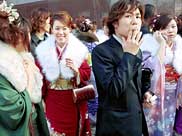January 16, 2002
The New Adults: Don't Be Fooled by the Kimonos
By HOWARD W. FRENCH
 |
| (Stuart Isett/Gamma, for The New York Times) |
| Coming of Age Day at a hotel in Tokyo on Monday. Old-fashioned appearances conceal fast-shifting attitudes. |
TOKYO, Jan. 14 — Filing into the ornate lobby of a luxury hotel here, a spanking new generation of adults almost appeared today to be outdoing themselves to live up to age-old images of young Japanese men and women.
The women, decked out in shimmering kimonos and gold lamé slippers, their hair painstakingly teased and their makeup flawless, shuffled around beaming or chatted away on cellphones.
The young men, all in dark suits, also stuck to type. Bunched in groups of four or five, they tugged on cigarettes and between jokes did their best to affect the poses of gravity that the beckoning world of work might once have expected of them.
Scenes like this were played out at city halls and hotel ballrooms across the country today as Japan marked Coming of Age Day.
The holiday, which celebrates the passage to adulthood of the country's 20-year-olds, is the modern interpretation of an old tradition.
In years past the ceremonies were long dragged out affairs where politicians and local dignitaries lectured halls full of young people on the responsibilities of adulthood. But that too has suddenly changed. Last year, a spate of pranks and hooliganism — from tubs of mayonnaise being thrown at speakers to indoor bursts of fireworks — persuaded the authorities to make things as short and snappy as possible from now on.
If the appearances of frivolous cuteness for young women and nose- to-the-grindstone dourness for their male counterparts are still the norm, they conceal fast-shifting attitudes on life, work and marriage in a rapidly aging society.
As Japan's dominance as a manufacturing superpower wanes in the space of a generation, other certainties of the past are disappearing too — from stable, full employment to quaint gender roles handed down from another era.
Yuko Tsuchiya, a university student in food science, appeared for today's ceremonies in a sumptuous red, gold and green kimono and furry white shawl. Although they have few role models from their mothers' generation, women like her today overwhelmingly say they want real careers. Just as men are making one wrenching adjustment — from robust job security to a lifetime of hopping from one company to another — Ms. Tsuchiya and many of her peers are forcing them to accept another: that young women will postpone or even forego marriage and motherhood.
"I want to do research on frozen foods and food processing for a large company," Ms. Tsuchiya said. "Perhaps I'll get married around the age of 30, but I can't think about that until I get a stable position in a company. And even after I get married, I want to keep working."
Yuya Yamamoto, a 20-year-old "freetah," or employee in a succession of noncareer, often low-paying jobs in service industries, is one man who would gladly allow someone like Ms. Tsuchiya to have her way. A mere generation ago, rare was the man who did not see himself as the breadwinner and spent little time in the conjugal home.
"I've worked in convenience stores and restaurants, and I hope some day to land an office job somewhere, maybe using computers, which is something I like," said Mr. Yamamoto, whose black hair was streaked modishly with blond. "If my income is high, my wife will have the choice between working or staying at home. If our circumstances are tight, she can work, and I'll happily share all the chores. I kind of like that idea."
Masumi Kashima, a 20-year-old trade school student, noted that "it is hard to deny that Japan's problems will affect my life."
"But if I focus on the negative, it will only limit me, and I want to lead a very full life." So her stated goals included a career, sports and a long list of hobbies. Until prodded, she never even mentioned marriage.
"From today on I am an adult, and for me, that means a distinct shift in my life," she said. "My immediate goals are to become self-reliant, to have a career and to live alone."
Pressed for what she would eventually look for in a husband, she spoke of her own parents, saying, "They are very close to their own children, and my family should be like that, too." In addition, "my husband should share my hobbies and my love of sports, and should share all of the housework, too — 50-50."
Kunihisa Kameno was one of the few open holdouts against change. "I'd like to get married as soon as possible," said the soon-to-be 20- year-old, who wore gunmetal blue contact lenses, a long black coat and white tie. "And I want to find a wife who is totally devoted to the house, because when I am working, I'll need someone to take care of me."
Mr. Kameno, who went to work at a fast-food company immediately after graduating from high school recently, said he spent little time worrying about the future.
"The people who are being fired are all middle aged or older, so it doesn't really concern us," he said. "Right now, I'm only working part- time, but one day I'll realize my goal of opening my own restaurant."
Copyright 2002 The New York Times Company
![]()